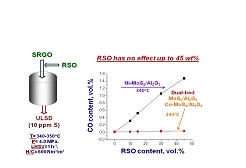
Irina V. Deliy
Novosibirsk National Research University, Russia
Title: The performance of dual-bed system of MoS2/Al2O3 and Co-MoS2/Al2O3 catalysts in ULSD production from the mixture of rapeseed oil and SRGO
Biography
Biography: Irina V. Deliy
Abstract
The critical challenge in the developing of the energy-efficient co-processing of triglyceride-based feedstock with straight–run gas oil (SRGO) for ULSD (ultra-low sulfur diesel) production is the elucidation of peculiarities of sulfide catalyst’s behaviour depending on their chemical composition. It is known, that the triglycerides conversion over sulfide Co(Ni)Mo/Al2O3 catalysts proceeds through the deoxygenation (with the water formation) or via decarbonylation (with COx production) pathways. But COx production is highly undesirable, because of ecological and technological reasons. In our work dual-bed catalytic system is proposed for the co-processing of rapeseed oil (RSO) – SRGO mixture into ULSD. The Mo/Al2O3 catalyst is used in the front layer to provide RSO conversion without considerable COx formation, the SRGO hydrotreating proceeds over traditional CoMo/Al2O3 catalysts. CoMo/Al2O3, NiMo/Al2O3 and dual-bed system (MoS2/Al2O3 and Co-MoS2/Al2O3 catalysts) were compared in the hydrotreating of blended feedstocks (up to 45% of RSO) using full-sized commercial granules and trickle-bed reactor. Total S, N, O contents and quality of produced fuels was checked using the corresponding ASTM methods. Characterization of the catalysts after reaction with TEM confirmed the formation of highly dispersed MoS2, CoMoS, and NiMoS nanoparticles. It was observed, that over NiMoS/Al2O3 catalyst ULSD can be produced from SRGO and RSO-SRGO blends at the same conditions (at 4.0 MPa, 340oC, LHSV - 1,5 h-1, H2/C- 600), while the sufficient increase of temperature is needed if the CoMoS/Al2O3 catalyst is used. In the case of the dual-bed system, RSO content has only minor effect on the catalyst efficiency in hydrotreating reaction, confirming that the decrease of HDS activity of CoMoS/Al2O3 catalyst in presence of RSO is due to CO inhibition. The use of dual bed system increase the products yield prevents COx formation and avoid the necessity of costly and energy-intensive purification of recycle hydrogen in co-processing of RSO-SRGO mixtures.
Acknowledgement: The work was supported by the Ministry of Education and Science of the Russian Federation, unique identificator RFMEFI57517X0128.

Figure 1: Effect of the rapeseed oil content on CO production during co-processing of rapeseed oil-SRGO mixture into ULSD over Ni-MoS2/Al2O3 and dual-bed system (MoS2/Al2O3 and Co-MoS2/Al2O3 catalysts).

